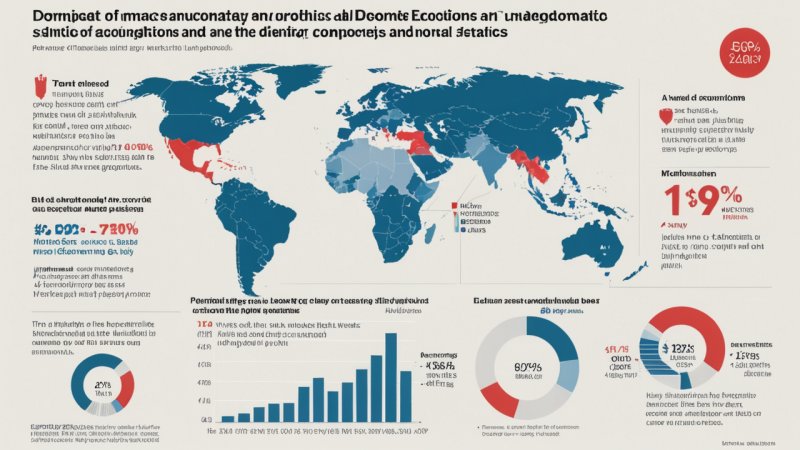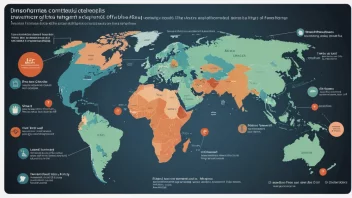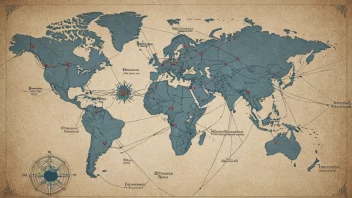Introduction
In today's interconnected world, economic sanctions have become a common tool for governments to exert pressure on other nations. This article will guide you through the process of understanding how economic sanctions impact domestic economies, explaining the mechanisms at play and the potential outcomes. By the end of this article, you will have a clear understanding of the effects of sanctions on both the targeted countries and their own economies.
Step 1: Define Economic Sanctions
Economic sanctions are restrictive measures imposed by countries or international organizations to influence the behavior of a targeted nation. They can take various forms, including:
- Trade restrictions: Limiting exports or imports to and from the targeted country.
- Financial sanctions: Freezing assets or restricting access to financial markets.
- Travel bans: Prohibiting certain individuals from entering a country.
Step 2: Identify the Goals of Sanctions
The primary goals of economic sanctions typically include:
- Changing government behavior: Forcing a change in policies or actions.
- Deterrence: Preventing future undesirable actions by the targeted nation.
- Signaling: Demonstrating international disapproval of certain actions.
Step 3: Analyze the Immediate Economic Effects
When sanctions are imposed, the immediate effects can include:
- Reduced trade: A significant drop in exports and imports can lead to economic contraction.
- Inflation: Scarcity of goods may drive prices up, affecting the cost of living.
- Unemployment: Businesses may lay off workers due to decreased demand and operational challenges.
Step 4: Examine Long-Term Economic Consequences
Over time, the effects of sanctions can evolve, leading to longer-term consequences such as:
- Structural changes: Economies may adapt by finding new trade partners or developing domestic industries.
- Capital flight: Investors may withdraw their funds, leading to a decrease in economic stability.
- Social unrest: Economic hardship can lead to dissatisfaction among the population, potentially resulting in protests or political instability.
Step 5: Assess the Impact on Global Economies
Economic sanctions can also have ripple effects on global economies, including:
- Disruption of supply chains: Sanctions can affect global trade networks, impacting businesses worldwide.
- Price fluctuations: Changes in supply and demand can lead to increased prices for commodities.
- Geopolitical shifts: Countries may realign their alliances in response to sanctions, affecting international relations.
Step 6: Explore Case Studies
To better understand the impact of economic sanctions, examining historical case studies can be insightful. Some notable examples include:
- The U.S. sanctions on Iran: Analyzing the economic repercussions on Iran's economy and the global oil market.
- Sanctions on North Korea: Understanding the effects on the country's economy and its nuclear ambitions.
- Sanctions against Russia: Evaluating the impact of sanctions following the annexation of Crimea.
Step 7: Consider Alternative Perspectives
It is essential to consider different viewpoints regarding the effectiveness and morality of economic sanctions. Some argue that sanctions:
- Are effective: They can compel governments to change their behavior.
- Hurt civilians: Sanctions may disproportionately affect the general population rather than the government.
- Can backfire: They may strengthen nationalistic sentiments and lead to further entrenchment of the targeted regime.
Summary
In summary, understanding the impact of economic sanctions on domestic economies involves defining sanctions, identifying their goals, analyzing immediate and long-term economic effects, assessing global repercussions, exploring case studies, and considering alternative perspectives. Sanctions remain a complex tool in international relations, with both intended and unintended consequences. As such, it is crucial to approach the topic with a nuanced understanding of the various factors at play.
Final Advice: Stay informed about current events and research to better grasp the evolving landscape of economic sanctions and their implications for domestic and global economies.






